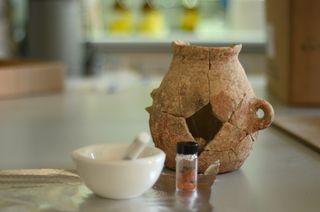8,000-Year-Old Olive Oil Found in Ancient Clay Pots

This story was updated Dec. 18 at 1:40 p.m. EST.
Ancient people pressed olive oil as far back as 8,000 years ago in Israel, a new study finds.
Researchers found residues of the Mediterranean-diet staple on ancient clay pots dating back to the 6th millennium B.C.
"This is the earliest evidence of the use of olive oil in the country, and perhaps the entire Mediterranean basin," Ianir Milevski and Nimrod Getzov, excavation directors at the Israel Antiquities Authority, said in a statement. [See photos of the fragments and reconstructed clay vessels]
The team discovered the clay vessels by accident. The government required an excavation at En Zippori in the Lower Galilee region of northern Israel before the Netivei Israel Co. could widen Highway 79. The researchers unexpectedly found the pottery during the excavation, which lasted from 2011 to 2013.
Milevski and Getzov wanted to find out what had once been stored in the vessels. So, the researchers, together with their colleague Dvory Namdar, of the Hebrew University of Jerusalem Institute of Earth Sciences, extracted organic residues left on the clay.
The analyses showed that the pottery containing olive oil dates back to the Early Chalcolithic period, a phase of the Bronze Age. To double-check their work, the researchers looked at modern clay shards with one-year-old olive oil residues on them, and found a strong chemical resemblance between the ancient and contemporary samples.
Sign up for the Live Science daily newsletter now
Get the world’s most fascinating discoveries delivered straight to your inbox.
In all, the researchers studied 20 pottery vessels, including two that date back to about 5,800 B.C., indicating that the oil was well preserved inside the vessels for almost 8,000 years. The findings support previous research that suggests people first domesticated the olive tree about 8,000 to 6,000 years ago.
Archaeologists have suspected that an olive oil industry once flourished in ancient northern Israel, but this is the first definitive evidence that this type of oil was used at such an early time.
"Although it is impossible to say for sure, this might be an olive species that was domesticated and joined grain and legumes — the other kinds of field crops that we know were grown then," Milevski and Getzov said.
The study was published online Nov. 24 in the Israel Journal of Plant Sciences.
Editor's Note: This story was updated to correct the millennium that the olive oil was dated to in the study.
Follow Laura Geggel on Twitter @LauraGeggel. Follow Live Science @livescience, Facebook & Google+. Original article on Live Science.

Laura is the archaeology and Life's Little Mysteries editor at Live Science. She also reports on general science, including paleontology. Her work has appeared in The New York Times, Scholastic, Popular Science and Spectrum, a site on autism research. She has won multiple awards from the Society of Professional Journalists and the Washington Newspaper Publishers Association for her reporting at a weekly newspaper near Seattle. Laura holds a bachelor's degree in English literature and psychology from Washington University in St. Louis and a master's degree in science writing from NYU.
Most Popular



